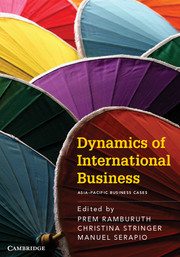Book contents
- Frontmatter
- Dedication
- Foreword
- Contents
- Contributors
- Preface
- Part I The Environment of International Business
- 1 AWB and the Iraqi Oil-for-Food scandal: Just a cost of doing business?
- 2 Walking the blurry line in China: Negotiating deals and staying out of jail
- 3 The feasibility of solar energy in el Junco
- 4 Colombian coffee: Issues of sustainability?
- 5 Preserving paradise: Shell’s sustainable development programs in the Philippines
- Part II Strategy and Entrepreneurship in International Business
- Part III Managing People in International Business
- Part IV Operating in International Markets
- References
4 - Colombian coffee: Issues of sustainability?
Published online by Cambridge University Press: 05 August 2013
- Frontmatter
- Dedication
- Foreword
- Contents
- Contributors
- Preface
- Part I The Environment of International Business
- 1 AWB and the Iraqi Oil-for-Food scandal: Just a cost of doing business?
- 2 Walking the blurry line in China: Negotiating deals and staying out of jail
- 3 The feasibility of solar energy in el Junco
- 4 Colombian coffee: Issues of sustainability?
- 5 Preserving paradise: Shell’s sustainable development programs in the Philippines
- Part II Strategy and Entrepreneurship in International Business
- Part III Managing People in International Business
- Part IV Operating in International Markets
- References
Summary
Colombia is renowned internationally for growing high quality Colombia mild Arabica coffee beans, characterised by a rich flavour and aroma. (Colombia mild Arabica coffee is an official type of coffee designated by the International Coffee Organisation.) Principally grown for the export market, Colombian coffee commands a premium price internationally, and is widely sought after by buyers. In 2007, the European Union granted a ‘Protected Designation of Origin’ order for Colombian coffee.
In recent years, Colombia’s ranking in production terms has dropped from second to fourth place, with the country losing ranking first to Vietnam in 1999 and more recently to Indonesia in 2009. The drop in ranking is largely a result of changing climatic conditions. Coffee exports from Colombia declined for a second consecutive year, from 12.5 million bags in 2007 to 7.8 million bags in 2011 (ICO 2013). The 2009 production level was the industry’s lowest since 1976 (USDA 2010), and much lower than initial forecasts of 11 million bags for 2010. Between 2005 and 2008, production levels averaged 11.71 million bags, guaranteeing surety of supply for international buyers. The decrease of three million bags of coffee represented a substantial loss of income not only for the local industry, but also for international traders and buyers – many of whom were unable to deliver the coffee for which they had entered into a forward purchase agreement and that they had on-sold due to the special characteristics of Colombian coffee. On the quality dimension, however, at the same time as production has been decreasing, quality has been increasing, due to the industry’s focus on improving quality.
- Type
- Chapter
- Information
- Publisher: Cambridge University PressPrint publication year: 2013



